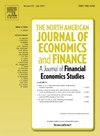Systemic risk and network effects in RCEP financial markets: Evidence from the TEDNQR model
IF 3.8
3区 经济学
Q1 BUSINESS, FINANCE
North American Journal of Economics and Finance
Pub Date : 2025-01-01
DOI:10.1016/j.najef.2024.102317
引用次数: 0
Abstract
The Regional Comprehensive Economic Partnership (RCEP) has brought both opportunities and new challenges to the Asia-Pacific financial markets. To analyze the spillover effects of stock market risk among RCEP countries, this paper constructs a comprehensive framework for systemic risk management encompassing three aspects: risk measurement, connectivity analysis and identification of influential factors. Specifically, we apply the CoES as a risk measurement metric to construct a tail risk network. Based on risk decomposition in sliding windows, we examine the hierarchical propagation pathways, intensities and evolution mechanisms of systemic risk in RCEP stock markets across four levels (system, group, country and institution). Subsequently, we use a tail-event driven dynamic network quantile regression (TEDNQR) model to explore the influence of network topology, node heterogeneity, and common factors on stock price changes across different quantile levels. Finally, we employ robustness analysis based on goodness-of-fit and DM test to validate the reliability of our methodology and conclusions. The empirical results indicate that both the risk performance and the influential factors of RCEP stock markets exhibit time-varying and tail characteristics. Overall, simultaneous network effects significantly and positively impact stock movements, playing a dominant role among all factors.
RCEP金融市场的系统性风险和网络效应:来自TEDNQR模型的证据
区域全面经济伙伴关系协定(RCEP)给亚太金融市场带来了机遇,也带来了新的挑战。为了分析RCEP国家间股市风险的溢出效应,本文构建了一个系统性风险管理的综合框架,包括风险度量、连通性分析和影响因素识别三个方面。具体而言,我们将CoES作为风险度量指标来构建尾部风险网络。基于滑动窗口的风险分解,研究了RCEP股票市场系统性风险在系统、集团、国家和机构四个层次上的传播路径、强度和演化机制。随后,我们使用尾事件驱动的动态网络分位数回归(TEDNQR)模型来探索网络拓扑结构、节点异质性和共同因素对不同分位数水平股票价格变化的影响。最后,我们采用基于拟合优度和DM检验的稳健性分析来验证我们的方法和结论的可靠性。实证结果表明,RCEP股票市场的风险表现及其影响因素均表现出时变和尾部特征。总体而言,同步网络效应显著正向影响股票走势,在所有因素中起主导作用。
本文章由计算机程序翻译,如有差异,请以英文原文为准。
求助全文
约1分钟内获得全文
求助全文
来源期刊
CiteScore
7.30
自引率
8.30%
发文量
168
期刊介绍:
The focus of the North-American Journal of Economics and Finance is on the economics of integration of goods, services, financial markets, at both regional and global levels with the role of economic policy in that process playing an important role. Both theoretical and empirical papers are welcome. Empirical and policy-related papers that rely on data and the experiences of countries outside North America are also welcome. Papers should offer concrete lessons about the ongoing process of globalization, or policy implications about how governments, domestic or international institutions, can improve the coordination of their activities. Empirical analysis should be capable of replication. Authors of accepted papers will be encouraged to supply data and computer programs.

 求助内容:
求助内容: 应助结果提醒方式:
应助结果提醒方式:


